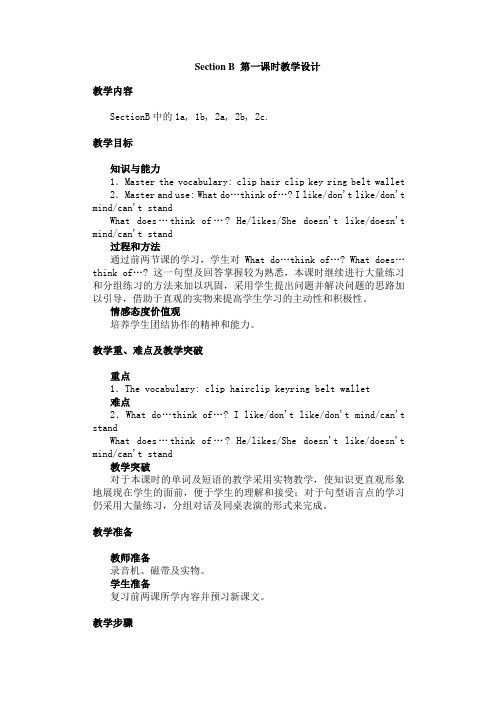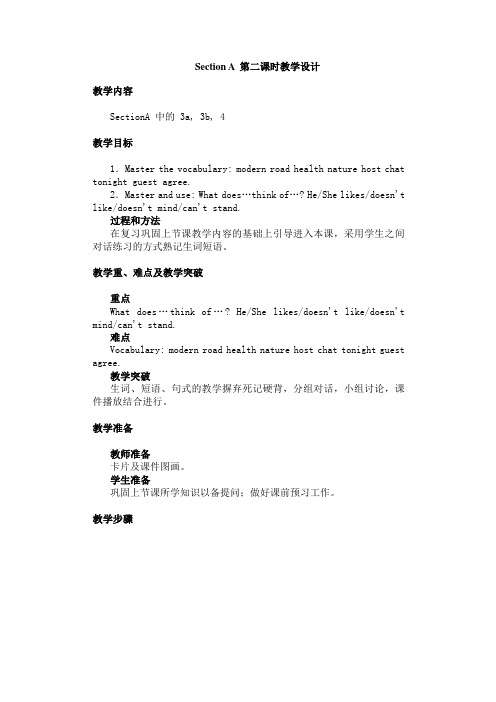人教版七年级英语unit11教学设计
- 格式:doc
- 大小:17.00 KB
- 文档页数:2

Section B 第一课时教学设计教学内容SectionB中的1a, 1b, 2a, 2b, 2c.教学目标知识与能力1.Master the vocabulary: clip hair clip key ring belt wallet 2.Master and use: What do…think of…? I like/don't like/don't mind/can't standWhat does…think of…? He/likes/She doesn't like/doesn't mind/can't stand过程和方法通过前两节课的学习,学生对What do…think of…? What does…think of…? 这一句型及回答掌握较为熟悉,本课时继续进行大量练习和分组练习的方法来加以巩固,采用学生提出问题并解决问题的思路加以引导,借助于直观的实物来提高学生学习的主动性和积极性。
情感态度价值观培养学生团结协作的精神和能力。
教学重、难点及教学突破重点1.The vocabulary: clip hairclip keyring belt wallet难点2.What do…think of…? I like/don't like/don't mind/can't standWhat does…think of…? He/likes/She doesn't like/doesn't mind/can't stand教学突破对于本课时的单词及短语的教学采用实物教学,使知识更直观形象地展现在学生的面前,便于学生的理解和接受;对于句型语言点的学习仍采用大量练习,分组对话及同桌表演的形式来完成。
教学准备教师准备录音机、磁带及实物。
学生准备复习前两课所学内容并预习新课文。
教学步骤本课小结本节课学习了5个生词和What do/does…think of…? 及回答句式的练习运用,通过本节课的学习,学生进一步巩固了本单元所学知识。



Section A 第二课时教学设计教学内容SectionA 中的 3a, 3b, 4教学目标1.Master the vocabulary: modern road health nature host chat tonight guest agree.2.Master and use: What does…think of…? He/She likes/doesn't like/doesn't mind/can't stand.过程和方法在复习巩固上节课教学内容的基础上引导进入本课,采用学生之间对话练习的方式熟记生词短语。
教学重、难点及教学突破重点What does…think of…? He/She likes/doesn't like/doesn't mind/can't stand.难点Vocabulary: modern road health nature host chat tonight guest agree.教学突破生词、短语、句式的教学摒弃死记硬背,分组对话,小组讨论,课件播放结合进行。
教学准备教师准备卡片及课件图画。
学生准备巩固上节课所学知识以备提问;做好课前预习工作。
教学步骤本课小结本节课共学习了14个生词和What does…think of…? He/She likes/doesn't like/doesn't mind/can't stand. 这一新型句型及回答,学生总体掌握不错。
练习设计题组一和题组二。
教学探讨与反思成功之处在于前后知识的衔接较好,导入新课过渡自然,学生对一般现在时态的掌握也比较好。
不足之处:部分后进生未达到教学目标要求,尤其是时态的掌握。
补救措施:加强课后辅导与个别指导。
板书设计Unit 11 What do you think of game shows?New words and phrases What does…think of…? …She/He likes/doesn't likedon't mind/can't stand.。


UNIT11 How was your school trip?Section A 第1课时(1a〜1c)自主学习方案1.自学生词,并记住拼读及拼写。
2.预习课本找出重点短语及句子。
(见学案自学导练内容)3.读记后完成自学导练内容。
课堂导学方案Step1 情景导入Teacher:We had a school trip last week. Did you have a good time? How was your school trip?Students : Not bad/Pretty good/Great/Terrible.Teacher :Did you take any photos?Did you feed chickens?What did you do?Please tell us what you did. Do you want to know what Carol did?环节说明:以上周的校游为话题,引出一般过去时态,简洁明了,直奔主题。
Step 2完成教材1a-1c的任务1.认真观察图片,将图片和la中所给的短语匹配。
集体核对答案,完成la。
(2分钟)2.教师领读la中的词组,学生跟读并且识记,然后两人一组互相提问。
以小组为单位总结动词过去式的构成规则,教师补充点拨。
(5分钟)3.大声朗读图片中的小对话,提前感知听力内容。
(2分钟)4.认真听录音,圈出Carol在校游时所做的事情,集体核对答案,完成lb的听力任务。
(3分钟)5.练习lc中的对话,并请学生表演。
(2分钟)6.模仿lc中的对话,利用la中的图片信息,两人一组来谈论Carol在校游时所做的事情,邀请几组学生来表演对话。
(4分钟)参考案例:A:Did Carol take any photos?B:Yes,she did. /No,she didn’t.7.小结训练。
(4分钟)(1)— What did Sam do on the farm?—He B chickens.A feedsB fedC grows(2)— C you to the zoo last Sunday?—No,I didn'.A. Do;goB. Are;going C . Did;go环节说明:听说结合,第一时间向学生传达语言目标,结对对话练习和小结训练,使语言目标得以强化。
人教版初中英语七年级下册Unit11SectionA教材全解Unit 11 How was your school trip?Unit 11 Section A课文全析1.How was your school trip?你的学校郊游怎么样?【重点注释】school trip学校的郊游。
一般在学校郊游结束后才会有感受或感触,在问学校郊游怎么样这个问题前学校郊游已经过去了,所以该句运用了一般过去时。
该句的回答可以是:It was great/wonderful/terrible!该句的同义句:How did you like(What did you think of/about或者What/How about) your school trip?2.go for a walk去散步【重点注释】go for a walk去散步,相当于take a walk。
walk此处作名词,意为“散步”。
例如:What about going for a walk?去散步怎么样?短语:go out for a walk出去散步,have/take a walk散步,have/take walks散步。
例如:Le t’s go out for a walk.让我们出去散步吧。
【拓展记忆】walk还可作不及物动词,意为“走路;散步”,后接表示地点的名词时,要加上介词to,但其后接here,there,home等地点副词时,不需加介词to。
例如:Let’s walk to the zoo.=Let’s go to the zoo on foot.让我们步行去动物园吧。
I usually walk to school.我通常步行去上学。
You can walk there.=You can go there on foot.你可以步行去那儿。
k a cow给奶牛挤奶【重点注释】milk此处作及物动词,意为“给……挤奶”,milk a cow给奶牛挤奶/挤奶牛的奶;milk还可作不及物动词,意为“挤奶,出奶”。
Unit 11 How was your school trip?句型设计Learning Objectives一、Topics(话题):School trips二、Functions (功能)Talk about past events三、Structures (结构)1. Simple past tense (I)2. How questions3. Yes/No questions and short answers4. Adjectives of description四、Target Language (目标语言)How was your school trip?It was great.Did you go to the zoo?No, I didn’t. I went to the farm.Were the strawberries good?Yes, they were.五、Vocabulary (词汇)countryside, cow, horse, farm, farmer, flower, sun, museum, fire, robot, guide, gift, feed, grow, pick, excellent, lovely, slow, fast, expensive, cheap, dark, exciting, interested, anything, everythinggo for a walk, milk a cow, ride a horse, feed chickens, take some photos, talk with a farmer, grow apples, be interested in …六、Skills (技能)Listening for key informationScanning in reading七、Recycling (复习巩固)great, terrible, interesting, boring, large, cool, hot, lucky, delicious八、教材分析本单元的话题是谈论学校郊游,要求学生学会使用一般过去式讲述过去发生的事情,学会用一般过去时写日记。
人教版七年级英语Unit11教学设计
Unit 11 How was your school trip?
Section A (2d — 3b)
【学习目标】【学习重点】:
1.继续学习谈论过去事件。
--How was your school trip? -- It was excellent/great/….
-What did sb. do/see/say/…? -- Lucky you.
2.并将所学知识学以致用。
【体验学习】:
I、预习交流
1.根据图片和对话等,预测新课内容;
2.根据音标拼读单词并牢记;
3.自学课文,勾画出重点和疑惑。
II、翻译官
1. 种苹果_____________________
2.摘草莓 ____________________
3. show around _________________
4.农场(主)___________________
5. 钓鱼 ______________________
6. 看星星___________________
7. 在乡下_____________________
8. Lucky you._________________
【课堂导学】:
I、新课呈现
Step1 Review and Lead-in
Quick action: The phrases in 1a or the past forms of the verbs.
Step2 Presentation
Show some pictures, ask and learn. eg:
--What did he/ she do? -- He/She picked some strawberries./
Step3 Pair work
Role-play the conversations in 2d.
Step4 Grammar Focus
1.Give a summary about it.
2.Try to recite it.
Step5 Presentation
1. Go through the letters in 3a.
2. Complete the two letters, then check the answers.
3. Read the letters together.
Step6 Group work
Make up a story. Each student adds a sentence. eg:
Student 1: Last week I visited my aunt’s house.
Student 2: The weather was beautiful.
Student 3: We went fishing.
Student 4: ….
Group work: 分析总结如何谈论过去事件,并模仿2d编写对话。
Notes:__________________________________________________________
__________________________________________________________
【自主检测】:
1. I ___________ in the library last weekend.
2.Let’s go to ___________! There are many new movies these days.
3.Jim ___________ last night, because he had an English speech contest this morning.
4.Grandpa often ___________ with his friends in the afternoon.
5. Yesterday I ____________ with my mother at the mall.
II、你来我往
A: 1. _______________, Peter!
B: Good morning, Alice!
A: Alice, 2._________________
B: Oh. It was great.
A: 3. ____________________
B: I went to the zoo with my friends.
A: 4. ___________________
B: We saw monkeys, pandas, tigers and so on. Then we went to the park and played games. A: 5.___________________
B: Yes, we had a good time.
A: Luck you.
【学习体会】
成功&收获: 失败&不足:。